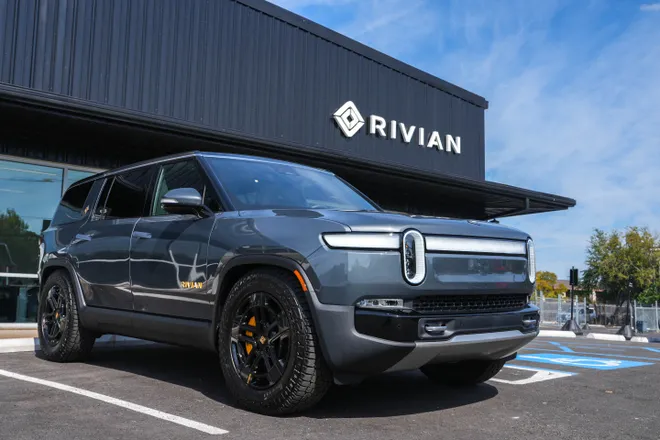In an era where sustainability and efficiency are not just ideals but necessities, Rivian’s latest innovation is making headlines. The launch of Rivian’s electric delivery vans is poised to revolutionize the logistics industry, offering a sustainable alternative to traditional delivery vehicles. As major corporations pivot towards eco-friendly operations, Rivian’s vans could become the cornerstone of a greener logistics system. In this article, we’ll explore how these cutting-edge EVs are set to transform the logistics landscape, delve into their innovative features, and assess what this means for the future of sustainable delivery.
Rivian’s EV Delivery Vans: A New Era in Logistics
The Rise of Electric Delivery Vans
The electric vehicle market has been expanding rapidly, with Rivian emerging as a key player in this transformation. In 2021, the company announced a landmark deal with Amazon for the delivery of 100,000 electric vans, a move that underscores the commitment of major retailers to reduce their carbon footprint. These electric vans are designed to not only meet the rigorous demands of delivery services but also to drastically cut emissions compared to their diesel counterparts.
- Eco-Friendly Design: Rivian’s delivery vans boast a zero-emission design, aligning with global sustainability goals. According to Bloomberg Green, replacing one traditional delivery van with an electric model can reduce CO2 emissions by up to 4.6 metric tons annually.
- Innovative Features: Packed with state-of-the-art technology, these vans feature advanced driver-assistance systems, optimized cargo space, and a robust electric drivetrain. This ensures they are not only environmentally friendly but also highly efficient and reliable.
Rivian vs. Traditional Delivery Vehicles
When comparing Rivian’s electric vans to traditional gas-powered delivery vehicles, the differences are stark:
- Environmental Impact: Traditional vans emit significant levels of CO2 and other pollutants, whereas Rivian’s EVs produce zero tailpipe emissions.
- Operational Costs: Electric vehicles generally have lower running costs due to cheaper electricity compared to diesel, reduced maintenance, and potential tax incentives.
- Performance: With instant torque and smooth acceleration, Rivian’s vans offer superior performance, particularly in congested urban environments.
How Rivian’s Vans Are Reshaping Logistics
Sustainable Delivery Solutions
Rivian’s delivery vans offer more than just environmental benefits. They are designed with the logistics industry’s unique needs in mind. Here’s how they’re reshaping logistics:
- Enhanced Efficiency: With their electric powertrains, these vans can travel long distances on a single charge, reducing downtime for refueling.
- Smart Fleet Management: Equipped with connectivity features, fleet managers can optimize routes and monitor vehicle performance in real-time, leading to substantial operational efficiencies.
- Adaptability: The modular design allows for customization, catering to different cargo requirements, from small packages to larger deliveries.
Charging Infrastructure and Support
A critical aspect of integrating EVs into logistics is ensuring a robust charging infrastructure:
- Charging Networks: Rivian is working on expanding charging networks, making it easier for businesses to adopt their EVs. This includes fast-charging options that can recharge the vans in as little as 30 minutes.
- Partnerships: Collaborations with energy providers are underway to ensure seamless energy supply and infrastructure development.
Practical Tips for Businesses Considering Rivian’s Vans
How to Charge Rivian’s Delivery Vans
Charging these electric vans is straightforward, with several options available:
- Home Base Charging: Install charging stations at your logistics hub for overnight charging.
- Public Charging Stations: Utilize Rivian’s growing network of fast chargers for quick turnaround times during the day.
Where to Buy Rivian’s Delivery Vans
Businesses interested in purchasing Rivian’s delivery vans can:
- Direct Orders: Contact Rivian directly through their website to place bulk orders.
- Fleet Management Companies: Some fleet management services offer Rivian vans as part of their leasing packages, providing flexibility and ease of integration.
What to Compare When Considering EVs for Logistics
When evaluating electric delivery vans, consider:
- Range and Charging Time: Ensure the vehicle meets your delivery radius and has acceptable downtime for charging.
- Cargo Capacity: Assess the van’s ability to handle your specific cargo needs.
- Cost and Incentives: Calculate the total cost of ownership, including potential government incentives for electric vehicles.
Conclusion: The Future of Green Logistics with Rivian
Rivian’s electric delivery vans are setting a new standard in the logistics industry, offering a compelling combination of sustainability, performance, and cost-efficiency. As businesses increasingly prioritize green initiatives, the adoption of such innovative solutions will likely accelerate. Are you ready to embrace the future of sustainable delivery? With Rivian leading the charge, the path to a cleaner, more efficient logistics network is clear.
Looking ahead, the role of electric vehicles in logistics is expected to grow, driven by technological advancements and increasing environmental awareness. Rivian’s commitment to innovation and sustainability positions them as a pivotal player in this transformative journey. Whether you’re a small business or a global enterprise, Rivian’s groundbreaking delivery vans could be the game-changer you’ve been waiting for.

